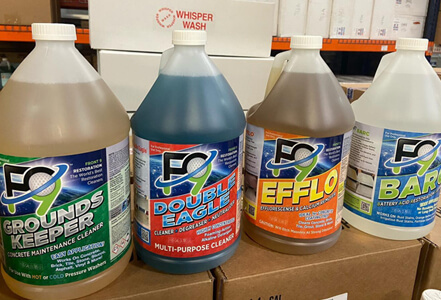
When most people think of pressure washing, they picture a powerful jet of water blasting away dirt and grime. But if you’re not using detergents, you’re only doing half the job — and probably working harder than you need to. 😓
Using the right cleaning solutions with your pressure washer doesn’t just improve cleaning results — it also protects surfaces, saves time, and can even prevent future buildup. But not all detergents are created equal. In this guide, we’ll break down everything you need to know about pressure washer soaps, degreasers, and specialty cleaners, so you can clean smarter and more effectively. 🧼💡
🧠 Why Use Detergent at All?
Let’s be honest — water alone can only do so much. Pressure is great for blasting away loose debris, but when you’re facing:
- Oil stains
- Mold and mildew
- Caked-on mud
- Algae and moss
- Oxidation or chalky residue
…water just won’t cut it.
That’s where detergents come in. These specially formulated cleaners are designed to break down tough grime at the molecular level, so your washer can rinse it away easily — often with less pressure needed. 💪
🔬 How Pressure Washer Detergents Work
Detergents used in power washing work through chemical action, loosening dirt and lifting it from surfaces. Most are surfactant-based, which means they lower the surface tension of water and help it penetrate grime and grease.
The key advantage? You can:
- Use lower PSI, reducing the risk of damage
- Clean more effectively and evenly
- Treat specific issues like mold, oil, or rust with targeted formulas
🧼 Think of it like washing your car — would you just rinse it with water and call it clean?
🧴 Types of Pressure Washer Detergents
Different jobs call for different types of cleaners. Here’s a breakdown of the most common categories:
🧽 1. General-Purpose Cleaners
- Safe for siding, patios, decks, fences
- Great for light dirt, mildew, dust
- Typically biodegradable and safe for plants 🌿
- Example: Simple Green House + Siding Cleaner
🛢️ 2. Degreasers
- Powerful cleaners for oily stains, garage floors, engines, and heavy machinery
- Often used in commercial or industrial jobs
- Example: Zep Industrial Purple Degreaser
🟢 3. Mold, Mildew, and Algae Removers
- Contain mildew-cides or sodium hypochlorite (bleach)
- Designed for shady or damp areas
- Perfect for siding, roofs, and patios
- Example: Wet & Forget Xtreme Reach Hose End
🧱 4. Concrete and Brick Cleaners
- Formulated to penetrate porous surfaces
- Lift stains caused by oil, rust, and tire marks
- Some contain citric acid or oxalic acid
- Example: Krud Kutter Concrete & Driveway Cleaner
🚗 5. Vehicle Wash Soaps
- Safe for paint and clear coat
- Low-pressure application
- Often foamy and pH-balanced
- Example: Chemical Guys Mr. Pink Snow Foam
🧼 6. Deck and Wood Cleaners
- Brighten wood without damaging it
- Remove mold, dirt, and algae
- Typically contain oxygenated bleach
- Example: Restore-A-Deck Cleaner
Browse Amazon Here For Popular Power Washing Detergents
🧪 Soap vs. Detergent: What’s the Difference?
You might hear people use the terms “soap” and “detergent” interchangeably, but they’re not the same:
- Soap is made from natural ingredients like fats and oils. It’s eco-friendly but can leave residue or scum, especially in hard water.
- Detergent is synthetic and designed to cut through grease, oil, and dirt — making it better for pressure washers.
In almost all cases, use detergent for pressure washing. It’s more effective and designed to rinse clean without buildup. ✅
🧰 How to Apply Detergent Correctly
Most pressure washers have either:
- A built-in detergent tank, or
- A siphon hose that pulls from an external container
To use detergent properly:
- Switch to a soap nozzle (usually black — 65° wide spray)
- Apply from bottom to top (so streaks don’t form)
- Let it dwell for 5–10 minutes, but don’t let it dry
- Rinse with a high-pressure nozzle (green or white tip)
🧠 Pro Tip: Always test a small area first to make sure the detergent is compatible with your surface.
⚠️ Safety and Environmental Tips
- Avoid bleach-heavy detergents near plants or grass
- Use biodegradable formulas when working near drains or landscaping
- Wear gloves and goggles if handling strong chemicals
- Never mix different detergents — dangerous reactions can occur
🌍 Many quality detergents today are eco-friendly and biodegradable, so always check the label!
🛒 Top-Rated Pressure Washer Detergents
Here are a few user favorites worth trying:
| Product | Best For | Features |
|---|---|---|
| Simple Green Oxy | General Cleaning | Non-toxic, biodegradable |
| Zep Heavy-Duty Degreaser | Garage Floors | Cuts grease fast |
| Mold Armor E-Z House Wash | Mold & Mildew | Bleach-based, powerful |
| Krud Kutter Driveway Cleaner | Concrete | Removes oil and rust stains |
| Karcher Car Wash Soap | Vehicles | Gentle and foamy |
💬 Final Thoughts
Adding detergent to your pressure washing routine isn’t an “extra” — it’s essential. Whether you’re cleaning your home’s siding, prepping a deck for staining, or removing years of oil buildup from concrete, the right detergent makes all the difference. 🌟
It saves time. It protects your surfaces. It gives better results — every time.
So don’t just blast away with water alone. Work smarter, not harder, and let chemistry do the heavy lifting. 🧪💦



